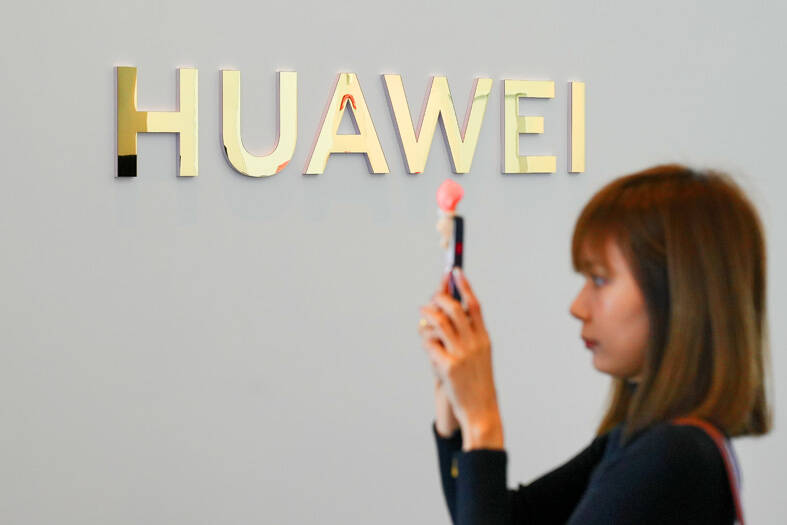Huawei Technologies Co (華為) posted its first quarterly net loss in years after the company spent aggressively on research in areas from electric vehicles (EVs) to chips while the business as a whole slowed.
The Shenzhen-based networking and electronics leader reported a 9.5 percent annual rise in revenue to about 276 billion yuan (US$38.1 billion) in the December quarter last year, according to Bloomberg’s calculations based on annual results.
Huawei took a big step forward in chipmaking and smartphones last year, when it debuted its own fully in-house operating system and began to compete with Nvidia Corp domestically on artificial intelligence (AI) server chips.

Photo: EPA-EFE
Hit by a series of US sanctions, Huawei spent heavily on research and development (R&D).
The company posted a net loss of about 300 million yuan for the December quarter of last year, compared with a net profit of 13.9 billion yuan a year previously when the company recorded gains from previous asset sales.
Overall, the company made a net profit of 62.6 billion yuan last year, down 28 percent from 87 billion yuan in 2023.
A Huawei spokesperson in a statement said that profit slipped last year because it “continued to increase... future-oriented investment and there were no gains from the sale of businesses.”
Huawei said it plowed 179.7 billion yuan into R&D last year, up 9.1 percent from 2023 and about one-fifth of overall revenue.
Revenue last year rose 22 percent year-on-year to 862.1 billion yuan, the highest since the figure surpassed 890 billion yuan in 2020.
Most of that came from its information and communication technology infrastructure business and consumer products — which encompass handsets, wearables and laptops — followed by cloud computing and telecom business.
The results were “in line with forecast,” Huawei’s rotating chairwoman Sabrina Meng (孟晚舟) said in a statement.

Taiwan Semiconductor Manufacturing Co (TSMC, 台積電) last week recorded an increase in the number of shareholders to the highest in almost eight months, despite its share price falling 3.38 percent from the previous week, Taiwan Stock Exchange data released on Saturday showed. As of Friday, TSMC had 1.88 million shareholders, the most since the week of April 25 and an increase of 31,870 from the previous week, the data showed. The number of shareholders jumped despite a drop of NT$50 (US$1.59), or 3.38 percent, in TSMC’s share price from a week earlier to NT$1,430, as investors took profits from their earlier gains

In a high-security Shenzhen laboratory, Chinese scientists have built what Washington has spent years trying to prevent: a prototype of a machine capable of producing the cutting-edge semiconductor chips that power artificial intelligence (AI), smartphones and weapons central to Western military dominance, Reuters has learned. Completed early this year and undergoing testing, the prototype fills nearly an entire factory floor. It was built by a team of former engineers from Dutch semiconductor giant ASML who reverse-engineered the company’s extreme ultraviolet lithography (EUV) machines, according to two people with knowledge of the project. EUV machines sit at the heart of a technological Cold

TAIWAN VALUE CHAIN: Foxtron is to fully own Luxgen following the transaction and it plans to launch a new electric model, the Foxtron Bria, in Taiwan next year Yulon Motor Co (裕隆汽車) yesterday said that its board of directors approved the disposal of its electric vehicle (EV) unit, Luxgen Motor Co (納智捷汽車), to Foxtron Vehicle Technologies Co (鴻華先進) for NT$787.6 million (US$24.98 million). Foxtron, a half-half joint venture between Yulon affiliate Hua-Chuang Automobile Information Technical Center Co (華創車電) and Hon Hai Precision Industry Co (鴻海精密), expects to wrap up the deal in the first quarter of next year. Foxtron would fully own Luxgen following the transaction, including five car distributing companies, outlets and all employees. The deal is subject to the approval of the Fair Trade Commission, Foxtron said. “Foxtron will be

INFLATION CONSIDERATION: The BOJ governor said that it would ‘keep making appropriate decisions’ and would adjust depending on the economy and prices The Bank of Japan (BOJ) yesterday raised its benchmark interest rate to the highest in 30 years and said more increases are in the pipeline if conditions allow, in a sign of growing conviction that it can attain the stable inflation target it has pursued for more than a decade. Bank of Japan Governor Kazuo Ueda’s policy board increased the rate by 0.2 percentage points to 0.75 percent, in a unanimous decision, the bank said in a statement. The central bank cited the rising likelihood of its economic outlook being realized. The rate change was expected by all 50 economists surveyed by Bloomberg. The